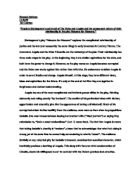This could be seen as an act of fear, suggesting he may be too afraid to start being a strict ruler and using his authority. As a Duke, it is likely that he will be in the public view a lot of the time, causing his every action to be scrutinized. His decision to run away and put somebody else in his place could be a result of cracking under the pressure of society constantly judging all his choices.
Of course Act 1 scene iii shows us what is really behind the Duke’s plan. Here he openly admits to being too kind a Duke, “We have strict statutes and most biting laws…Which for this fourteen years we have let slip.” This confirms our suspicions that the Duke has not been the best, most consistent ruler. Vienna has gone into a state of slackness, where some vital laws no longer apply. He suggests to the Friar that Angelo is the more appropriate man to awaken all these laws than himself. This, again, could be because the Duke is scared of looking like an evil person and being judged.
However, the Duke does seem to put good reason behind his thinking. He says that because it was him that let the laws become so slack in the first place, it would seem hypocritical of him to suddenly enforce these laws after letting them be for so long. One may be able to empathise with this idea, agreeing that maybe to ensure new laws are kept and taken seriously, then a new ruler must come into play. Of course, the Duke thinks of the perfect way to introduce a new ruler and yet still hold his authority over the city, pretending that he is leaving temporarily and is in need of someone to take his place.
Here is where we gain our insight into Angelo as a ruler. In Act 1 scene ii, we learn that Claudio has been sentenced to death for sleeping with Juliet. This is at the hand of the new and temporary ruler, Angelo. The audience is immediately thrust into the position that Angelo has been put in and is made to quickly judge what kind of decisions he is making. One may argue that his strict imposition of the laws is a good decision as a new ruler as he has not yet established himself or what kind of Duke he will be. This complies with the contemporary ruler at the time, King James I of England, who wrote in his book Basilikon Doron, “And when ye have by the severitie of justice once settled your countries, and made them knowe that ye can strike, then may ye thereafter all the days of your life mixe justice with mercie, punishing or sparing, as ye shall finde the crime to have been wilfullie or rashlie committed, and according to the by-past behaviour of the committer.” This quote from James I suggests that a ruler should first establish himself as a good and fair ruler who wishes to strive for justice by punishing those who go against it. Once his people know that he is serious about the laws of his country, then a good ruler can use judgement to punish where appropriate. This supports the actions of Angelo, who is put in the difficult position of trying to establish himself in a city that is already corrupt because of his predecessor. The audience may sympathise with him due to the situation that the Duke has left him in.
However, we could argue that this strictness will inevitably put an innocent man to death. It may be suggested that the best choice for Angelo would be to use better judgement when considering which laws to enforce again and which to just let lie. This could be seen as Angelo being inexperienced and naïve, something which again may bring us to pity him being submerged into this position of authority. One could even interpret Angelo as being a nasty, cruel man who wishes to abuse his power that he has been given, especially as it is only temporary. However, the reluctance with which he took up the position suggests that this is not the case and the more likely case is that he fears being rejected, possibly even mocked, by his people and as a result he wishes to take a leaf out of James I’s book and imposes order among Vienna.
A much more compromised ruler would be that of Escalus. Although Act 1 sees very little of his ruling skills, we do hear the reputation he holds and the respect that the Duke seems to have for him. As said before, the Duke states that Escalus would have been the obvious first choice for his temporary replacement, and yet he changes his mind. This may suggest that the role of the Duke may lead to some form of lesson that may need to be learnt by the Duke’s choice. He may think that Escalus would not gain anything from the role as he is already too wise and knowledgeable about mankind, “Your own science/ Excceds, in that, the lists of all advice/ My strength can give you”. This shows the respect that the Duke has for Escalus and how aware he is of Escalus’ already existing abilities. This may explain why he feels that Escalus would not benefit from leading Vienna whilst the Duke is away.
However, you could argue that this may not be the best angle to choose a ruler from. It seems that the Duke may be choosing a ruler from the point of view of who it would benefit most but what he should perhaps be doing instead is thinking about who will benefit the city most and who will be the most effective ruler. It seems that Escalus would possibly have been a wiser choice.
In spite of this, the fact is that Escalus will be there to guide Angelo no matter what decision he makes. This means that he is there should Angelo feel the need for any assistance and it also means the Escalus will indeed have some power and authority over the rest of the city. This allows the audience to see what kind of ruler he is anyway, even though he is not the highest authority around. This produces a direct comparison between the three as rulers and means that the audience is able to compare them in turn as they each show their signs of rulership.
In conclusion, it appears that each character that is presented as a ruler takes up a different corner in terms of how they each approach their position of authority. While the Duke has recognised that he has been too leniant in recent years, it could easily be suggested that his actions are cowardly and even unwise. Angelo, on the other hand, sees the opportunity to enforce laws that have not been in place. This seems to be the aim of the Duke’s plan, yet one may question to what extent the Duke wished Angelo to force these laws on the people. This makes us assume that Angelo has taken almost the complete opposite approach to the Duke. Escalus, however, seems to provide a contrast between both the Duke and Angelo. Whilst he does not seem like the type to let people get away with anything, he also does not seem like the type to put innocent, decent men to death. It seems to me that Escalus is the character who follows James I’s advice the best, using his judgement and circumstances to provide honest justice.







